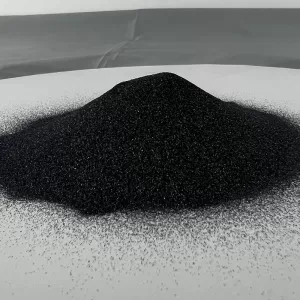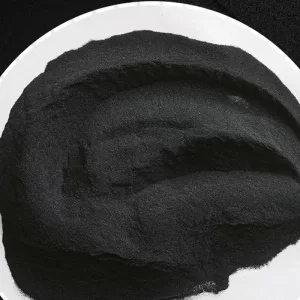Silicon carbide is an inorganic substance with the chemical formula SiC. There are many ways to prepare silicon carbide, including using raw materials such as quartz sand, petroleum coke (or coal coke), sawdust (salt is needed to produce green silicon carbide) through high-temperature smelting in a resistance furnace. According to different preparation processes, silicon carbide can also be divided into many types, such as reaction-sintered silicon carbide, pressureless-sintered silicon carbide and recrystallized silicon carbide.

Black silicon carbide particle size sand manufacturer
Black silicon carbide is a form of silicon carbide with a wide range of properties and applications. The following are the main functions and uses of black silicon carbide:
Electrical use: Black silicon carbide can be used as a heating element, nonlinear resistor element and semiconductor material. For example, silicon carbon rods, nonlinear resistor elements and various lightning arrester plates are all black silicon carbide applications.
Abrasive use: Black silicon carbide can be used to manufacture bonded abrasives, coated abrasives and free grinding, and then used to process glass, ceramics, stone, cast iron and some non-ferrous metals, cemented carbide, titanium alloy, grinding wheels, etc.

Refractory and corrosion-resistant materials: Black silicon carbide can be used to manufacture a variety of silicon carbide ceramic products, such as shelves and saggers in ceramic kilns, silicon carbide bricks for vertical cylinder distillation furnaces in zinc smelting industry, aluminum electrolytic cell linings, crucibles, small furnace materials, etc.
Power electronic devices: Black silicon carbide is a material for manufacturing power electronic devices due to its high electron mobility and low resistivity. It is widely used in electric vehicles, solar panels, high-power LED light sources and other fields.

Chemical uses: Black silicon carbide can be used as a purifier for smelting steel, such as a deoxidizer and cast iron structure improver.
Optoelectronic devices: The optoelectronic properties of black silicon carbide, such as heat resistance and energy loss threshold, make it a material for manufacturing optoelectronic devices such as LEDs and photodetectors.
Protective materials: Black silicon carbide has high hardness, good temperature stability and anti-abrasiveness, making it an important protective material in the fields of ships, automobiles, and chemical industries.
